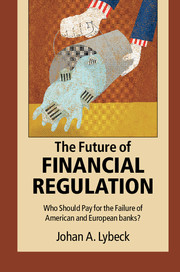Book contents
- Frontmatter
- Dedication
- Contents
- List of figures
- List of tables
- List of boxes
- Preface
- Acknowledgements
- List of abbreviations
- Introduction
- Part I A chronological presentation of crisis events January 2007 – December 2014
- Part II Bail-out and/or bail-in of banks in Europe: a country-by-country event study on those European countries which did not receive outside support
- 1 United Kingdom: Northern Rock, Royal Bank of Scotland (RBS), Lloyds Banking Group
- 2 Germany: IKB, Hypo Real Estate, Commerzbank, Landesbanken
- 3 Belgium, France, Luxembourg: Dexia
- 4 Benelux: Fortis, ING, SNS Reaal
- 5 Italy: Monte dei Paschi di Siena
- 6 Denmark: Roskilde Bank, Fionia Bank and the others vs. Amagerbanken and Fjordbank Mors
- Part III Bail-out and/or bail-in of banks in Europe: a country-by-country event study on those European countries which received IMF/EU support
- Part IV The TARP program and the bailing out (and bailing in) of US banks
- Part V Summary of the micro studies
- Part VI Political and regulatory responses to the crisis: to bail out or to bail in, that's the question
- Conclusion: toward host-country supervision and resolution?
- Addendum
- Bibliography
- Index
1 - United Kingdom: Northern Rock, Royal Bank of Scotland (RBS), Lloyds Banking Group
from Part II - Bail-out and/or bail-in of banks in Europe: a country-by-country event study on those European countries which did not receive outside support
Published online by Cambridge University Press: 05 February 2016
- Frontmatter
- Dedication
- Contents
- List of figures
- List of tables
- List of boxes
- Preface
- Acknowledgements
- List of abbreviations
- Introduction
- Part I A chronological presentation of crisis events January 2007 – December 2014
- Part II Bail-out and/or bail-in of banks in Europe: a country-by-country event study on those European countries which did not receive outside support
- 1 United Kingdom: Northern Rock, Royal Bank of Scotland (RBS), Lloyds Banking Group
- 2 Germany: IKB, Hypo Real Estate, Commerzbank, Landesbanken
- 3 Belgium, France, Luxembourg: Dexia
- 4 Benelux: Fortis, ING, SNS Reaal
- 5 Italy: Monte dei Paschi di Siena
- 6 Denmark: Roskilde Bank, Fionia Bank and the others vs. Amagerbanken and Fjordbank Mors
- Part III Bail-out and/or bail-in of banks in Europe: a country-by-country event study on those European countries which received IMF/EU support
- Part IV The TARP program and the bailing out (and bailing in) of US banks
- Part V Summary of the micro studies
- Part VI Political and regulatory responses to the crisis: to bail out or to bail in, that's the question
- Conclusion: toward host-country supervision and resolution?
- Addendum
- Bibliography
- Index
Summary
The United Kingdom story
There appears to be no real consensus in the United Kingdom as to whether the financial crisis was mainly occasioned by international factors or mainly home-grown. The influential Turner review writes (p. 29) that “at the core of the crisis lay an interplay between macro-imbalances which had grown rapidly in the last ten years, and financial market developments and innovations which had been underway for about 30 years but which accelerated over the last ten to 15, partly under the stimulus of the macro-imbalances.” British banks were basically following mainstream international developments – “the origins of the crisis were to a significant degree global” – but influenced also by the doubling of British residential property prices between 1997 and 2007 (only Ireland was worse at 250 percent!) and the rapid increase in mortgage debt, from 50 percent of GDP in the year 2000 to 80 percent of GDP in 2006. While securitization of mortgages was far from as prevalent as in the United States, it still rose from basically nothing in 1995 to over 25 percent of mortgage lending in 2005 (including mortgage-backed securities as well as covered bonds).
The Turner Review also blames the insufficient quantity and quality of capital under Basel II, as well as the over-reliance on model-based approaches to regulatory capital. While the major British banks had seemingly healthy BIS ratios at the end of 2007 in comparison with the required 8 percent (HSBC 13.60 percent, Royal Bank of Scotland 11.20 percent, Barclays 12.10 percent, Halifax Bank of Scotland 11.10 percent, Lloyds TSB 11.00 percent, Standard Chartered 16.70 percent, Northern Rock 11.60 percent), in reality the underlying situation had deteriorated substantially, with the ratio of capital to (unweighted) assets falling dramatically from 4.7 percent in 2000 to 3.2 percent just six years later in 2006, implying an increase in leverage from 21 to 31 times. Obviously some banks, as shown in Figure 4, were much higher at a leverage ratio of 50 or even 60.
If rising leverage ratios showed the increasing vulnerability of British banks to financial shocks, falling household savings ratios (Figure 5) indicated the parallel increasing vulnerability of households. From a healthy 9 percent (of disposable income) in 1997, personal savings fell to a low of zero at the end of 2007.
- Type
- Chapter
- Information
- The Future of Financial RegulationWho Should Pay for the Failure of American and European Banks?, pp. 149 - 174Publisher: Cambridge University PressPrint publication year: 2016



